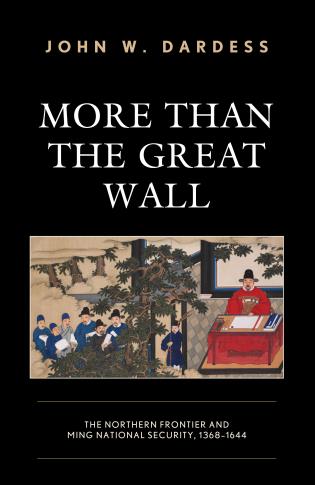More Than the Great Wall: The Northern Frontier and Ming National Security, 1368–1644

Details
Pages: 572 • Trim: 6¼ x 9¼
978-1-5381-3510-5 • Hardback • October 2019 • $129.00 • (£99.00)
978-1-5381-3511-2 • eBook • October 2019 • $122.50 • (£95.00)
Subjects:History / Asia / China, History / Military / Ancient Warfare
Author
TOC
Introduction
1 Laying the Foundations: Taizu, r. 1368–98
2 Defensive Buildup, Offensive Thrust: Yongle, r. 1403–24
3 A Zenith of Peace? Xuande, r. 1426–35
4 Troubles Mount: Zhengtong, r. 1436–49
5 Emperor in Captivity: Zhengtong, r. 1449–50
6 Recuperation: Jingtai, r. 1450–57 183
7 A Surge in Violence: Tianshun, r. 1457–64
8 No Respite: Chenghua, r. 1465–87
9 The Stresses Intensify: Hongzhi, r. 1487–1505
10 A Warrior Emperor: Zhengde, r. 1505–21
11 Fortress China: Jiajing, r. 1521–67
12 Peace Dawns! Longqing, r. 1567–72
13 First Peace, Then Militancy: Wanli, r. 1572–1620
14 The Last Frontier: Liaodong, r. 1573–1627
Cast of Principal Characters
Notes
Key Sources
About the Author
Reviews
With his impressive command of the sources, John Dardess has produced the comprehensive narrative of China’s northern frontier in Ming times.
— Michael Szonyi, Harvard University
Drawing from an impressive array of primary sources and informed by recent secondary studies, this book offers a tremendous overview and analysis of the evolution of Ming defense policies concerning the northern frontier. Countering traditional narratives of stasis and decline, John Dardess reveals the dynamic resilience of the Ming bureaucratic-military infrastructure, providing keys to understanding the reasons the Ming maintained their hegemony in Asia for nearly three centuries. Particularly salient is the author’s consideration of the characters and personal interests of the various Ming emperors in shaping policy. The picture that emerges is one of strategic flexibility based on realpolitik assessments but glossed with a veneer of stability. At the same time, the author is sensitive to the fluidity of steppe politics as they related to the Ming tributary system.
— Kenneth Swope, United States Naval Academy
This is a truly extraordinary book that will become required reading for anyone studying Chinese history. The longitudinal study of northern border security over centuries puts into context the very human struggle of Ming emperors, statesmen, and generals to manage a persistent and ultimately insoluble external threat. Despite changes in emperors, officials, and policies, the drivers of barbarian incursions remained outside the grasp of the Ming government in Central Eurasia and the steppe. Dardess has done a great service to the field of Chinese history and security studies in driving home the unpleasant truth that foreign security threats can often only be reacted to rather than resolved.
— Peter Lorge, Vanderbilt University